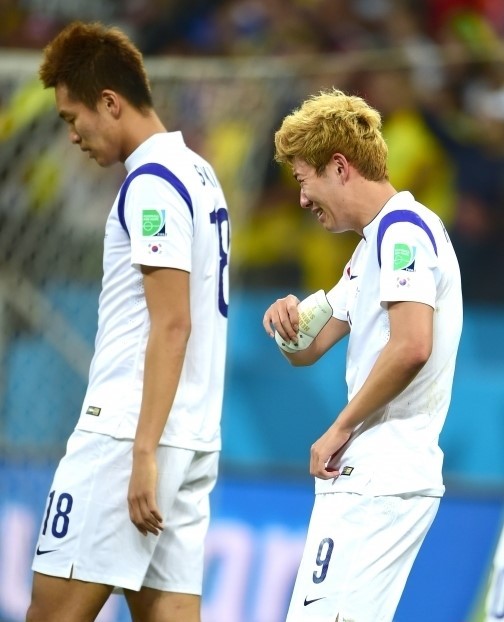by STEVE HAN
You can’t say it wasn’t expected. Korea will head home after just three games at the 2014 FIFA World Cup in Brazil, after it lost 1-0 to Belgium on Thursday. Finishing last in Group H, Korea exits the tournament with one draw and two losses.
Korea needed to beat Belgium by at least two goals to have a shot at advancing to the next round, but its chances came to a screeching halt when Jan Vertonghen put Belgium ahead with the winning goal with just 12 minutes remaining. While there is no shame in losing to Belgium, one of the world’s best up-and-coming teams, Korean fans and media alike will not be too forgiving about losing to a team that rested most of its regular starters. Belgium was also down a man for more than half the game after Steven Defour was shown a red card for stomping on Kim Shin-wook’s leg in the first half.
Three post-game thoughts on Korea’s early exit from the tournament:
We may have seen the last of head coach Hong Myung-bo, South Korea’s living legend. Hong is the closest thing Korea has to Germany’s Franz Beckenbauer and Holland’s Johan Cruyff, in that he defined an era for his country both as a player and coach. The now 45-year-old not only earned the nickname “Eternal Captain” by leading the magical Taegeuk Warriors’ team that advanced to the semifinals of the 2002 World Cup as a player, he also guided Korea to its first ever medal (bronze) at the Olympic Games in 2012 as its head coach. His undisputed legacy is in danger of being tarnished for good after Korea’s disappointing showing in Brazil this summer, especially after he was accused of favoritism in his player selections. His currently contract with Korea runs through next year, but the public scrutiny may end his tenure early.
In the end, Korea just wasn’t ready to compete at this level. We can debate all day about tactics, players and whether Hong should be replaced, but the problem at this year’s tournament was that Korea just wasn’t good enough. The team consisted of bright young talents, most of whom played integral roles in Korea’s bronze medal win at the Olympics (each team at the Olympics can only have three players older than 23) two years ago, but the World Cup is a different ballgame. Unlike the Olympics where young players compete with each other, the World Cup is where the world’s best of the best go head to head. The key players from the team in London in 2012–Park Chu-young, Ki Sung-yueng and Koo Ja-cheol–were not the same players this time around for various reasons, including injuries and lack of playing time at their respective clubs.
For Team Korea to be competitive every four years at the World Cup, major changes must occur within the nation itself. For Korea to truly become a quality team consistently against the world’s best, substantial changes are needed in how the Koreans as a whole consume the sport of soccer. While it’s no secret that the World Cup fever on the streets of Seoul is rampant, soccer itself has never been a marketable game in Korea. A sad reflection of that is the fact that the average attendance of the K-League, South Korea’s professional soccer league, is only at 7,900 per game this year, while hardly any of those games are televised. Many of Korea’s current national team players grew up chasing after the ball on a dirt field. While the World Cup has turned into something of a “show business,” investment of attention and money at the grassroots level for the sport of soccer is still lacking. Unless this culture changes, Korea will continue to post mediocre performances at the World Cup.
Image via Joy News.







